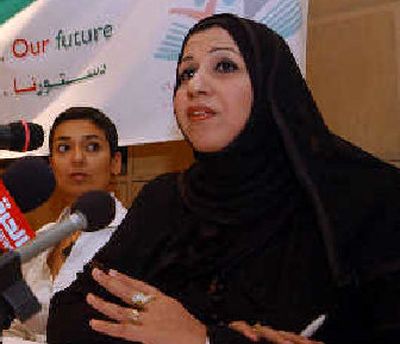Iraq women’s rights fight like America’s

The Iraqi women traveled by car from Baghdad to Amman, Jordan, a 14-hour trip. They met with others from around the world, under the auspices of Women for Women International. They brainstormed what they would like to see in Iraq’s constitution, a document being drafted now.
I could not see the women, but I heard the voices of a few of them Wednesday. It was 6:30 in the morning in Spokane and 4:30 in the afternoon in Jordan when I joined journalists throughout the world in a teleconference. We listened together to what these women hope will be included in Iraq’s constitution – if it is ever finished, ever voted upon, ever adhered to in a country now chaotic with war.
I sat at my dining room table in Spokane, surrounded by newspapers, and as I waited for the teleconference to began, I scanned the ads and noted the ways in which we celebrate the Fourth of July, our holiday to remember the early days of freedom-getting in the United States.
We buy big hunks of meat and barbecue them. We chill beer in big coolers and drink a cold one. We complain if it rains. And we complain about sunburns and bugs if the sun shines. We roast weenies on the Fourth of July, because we are weenies.
We might travel 14 hours for fun, but most of us cannot imagine what it would mean to travel 14 hours – under threat of roadside bombs – to brainstorm desired freedoms that might never come to be.
Very humbling. And this awareness held in check my impatience with the teleconference’s difficulties. It was hard to hear the press conference participants, for starters. Then a male panelist kept answering the reporters’ questions, when we really just wanted to hear from the women. And someone on our shared line was breathing loudly into the phone – very distracting.
Later, at the U.S. National Archives Web site, I read about the difficulties and distractions the writers of the U.S. Constitution faced during the summer of 1787 at the Constitutional Convention in Philadelphia. George Washington, their leader, was ill with rheumatism, mourning the loss of his brother and doubting that the convention would amount to much. Only 55 of the 74 appointed delegates attended. The delegates argued bitterly, and there wasn’t a woman in the bunch, of course.
The women of Iraq who attended the conference in Jordan this week dreamed big dreams of freedom. They recommended that the women of Iraq share rights equal to those of men. They recommended a constitutional guarantee that at least 40 percent of the seats in the legislature be reserved for women. And they urged the creation of a Committee to Protect Women’s Rights.
I thought of the women Thursday as they journeyed back to Iraq, another long car ride. Were they hopeful that their hard work would be incorporated into the constitution? Where will these women be 10 years from now? And if the United States exits Iraq sooner rather than later – as I and some others hope – will this doom the women’s dreams forever?
Freedom and liberty are fragile rights, especially for women. The Iraqi women debated vigorously the role of Islamic law under the constitution. Many would like to see Islamic law be just “one source of jurisprudence among others.” Their debate ensued as progressive women in neighboring Iran adjusted to the news that their new leader, a religious hardliner, might further restrict the freedom of women to move about their lives.
The teleconference experience gave me a renewed appreciation for our founding fathers. Their work began with the Declaration of Independence in 1776, the signing of which we celebrate Monday. Then, a decade later, they began to hammer out our U.S. Constitution and the essential Bill of Rights.
They had their doubts that their liberty-and-justice-for-all dream would ever take hold. But it did. If it hadn’t, I would not possess the freedom to dial into a press conference a world away and then write these words of opinion that appear here today.